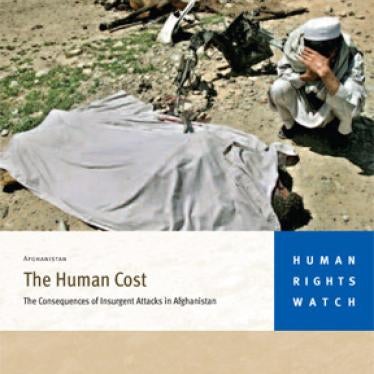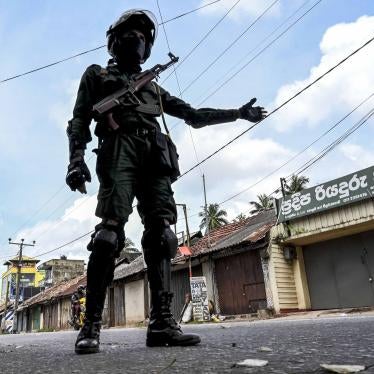(New York) - The Taliban should immediately release all hostages in its custody, Human Rights Watch said today. The recent abduction and hostage-taking of at least five Afghan, two German, and 23 South Korean civilians, and the reported killing of several of them, are war crimes.
These abductions of civilians by the Taliban are part of a long line of such cases, including the Taliban’s brutal killing a few months ago of Afghan journalist Ajmal Naqshbandi, kidnapped in Helmand province, and driver Sayed Agha. Since the beginning of the year, the Taliban have kidnapped at least 41 Afghan civilians and killed at least 23 of them. Eighteen remain missing.
“The Taliban’s abductions and murders show contempt for human life and disregard for the laws of war,” said Joanne Mariner, Human Rights Watch’s terrorism and counterterrorism director. “The taking of hostages is a war crime.”
On July 19, 23 South Korean civilian aid workers were abducted in Ghazni province, while the group of five Afghans and two Germans were abducted in Wardak province the previous day. (One of the Afghans was later released). Both groups are believed to be in Taliban custody. In addition, a four-man Afghan health team was reported missing in southern Afghanistan on Monday; it is feared that they too have been kidnapped.
A purported Taliban spokesman, Qari Yousuf Ahmadi, has repeatedly threatened that the Taliban will kill the hostages unless the Afghan government releases Taliban prisoners. Over the past 10 days, three of the hostages have been killed. One of the Korean hostages, Bae Hyung-kyu, was killed last week; his body was found with multiple gunshot wounds on July 25. The bullet-ridden body of a second Korean, Shim Sung-min, was found on the morning of July 31.
The body of a German hostage, Rüdiger Diedrich, was found in Wardak province last week. An autopsy performed when the body was returned to Germany showed that Diedrich died of gunshot wounds.
The Taliban have reportedly threatened to kill more hostages. Purported Taliban spokeman Qari Yousuf Ahmadi told journalists on Tuesday: “If the Kabul government does not release the Taliban prisoners, then we will kill after 12 o’clock; we are going to kill Korean hostages.” He continued: “It might be a man or a woman . . . It might be one. It might be two, four. It might be all of them.”
The laws of war prohibit the taking of hostages, which is defined as threatening to harm or continuing to detain a person to compel a third party to do or abstain from doing something as a condition of release.
Hostage-taking and the summary execution of any person in custody are prohibited by Common Article 3 to the 1949 Geneva Conventions, which is applicable to the armed conflict in Afghanistan, as well as customary international law during non-international armed conflicts.
Hostage-taking and the summary execution of prisoners are war crimes under the Rome Statute of the International Criminal Court, which Afghanistan has ratified, and under customary law.
The Taliban appear to be resorting increasingly to the abduction of civilians. The kidnapping of the 23 Koreans is one of the largest abductions of civilians since 2001, when the Taliban were removed from power. In a video released last week, a Taliban leader said that kidnapping foreigners had been a “very successful policy.”
“The Taliban seem to think the laws of war don’t apply to them,” Mariner said. “But the world is paying attention to their crimes.”
According to Human Rights Watch’s Afghanistan Casualty Database, at least 374 Afghan civilians have been killed during Taliban attacks in 2007, and at least 631 civilians have been injured, resulting in more than 1,000 civilian casualties in a six-month period. Since the beginning of the year, the Taliban have also carried out least 100 attacks targeting civilians or executing civilians in their custody, including at least 28 beheadings. These attacks have resulted in at least 221 civilian deaths, and injuries to 173 more.
Human Rights Watch has documented the Taliban’s increasingly abusive behavior in a series of reports. In "The Human Cost: The Consequences of Insurgent Attacks in Afghanistan,” published in April, Human Rights Watch described how the Taliban and associated forces sharply escalated suicide bombings and other attacks in 2006 and early 2007, killing hundreds of civilians. “Lessons in Terror,” published in July 2006, described the Taliban’s increasing attacks on schools and teachers.







